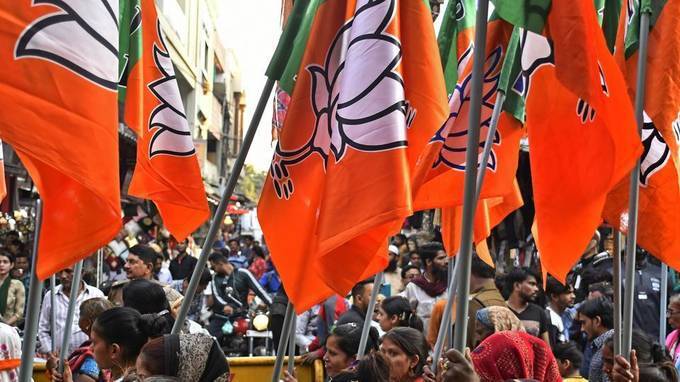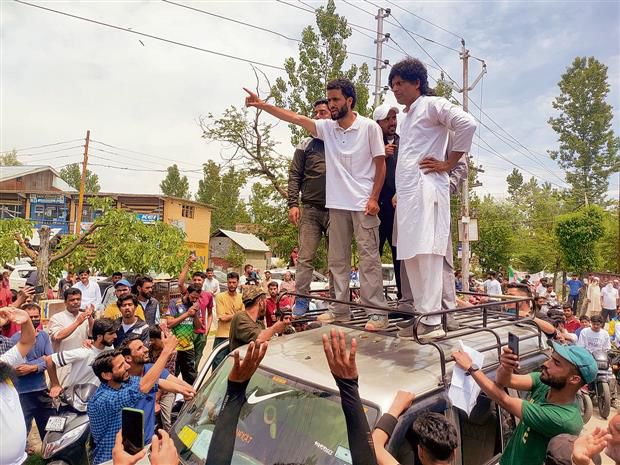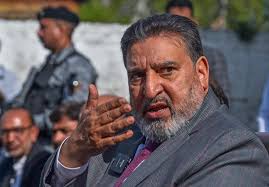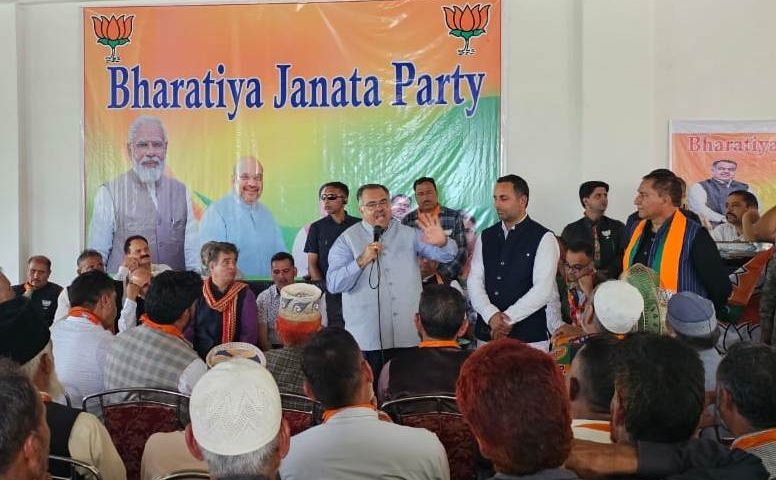Party leaders said they were surprised by the party high command’s decision to not field candidates in three Kashmir seats of Srinagar, Baramulla and Anantnag-Rajouri Lok Sabha seats
The Bharatiya Janata Party’s (BJP) decision to not contest the Lok Sabha elections on all three seats in Kashmir Valley is a dampener for the cadre in the region, as they had prepared to face the first electoral battle since the abrogation of Article 370 and bifurcation of the erstwhile Jammu & Kashmir state into two Union territories in 2019, party leaders said.
The leaders, who spoke to HT on condition of anonymity, said while they were surprised by the party high command’s decision to not field candidates in three Kashmir seats of Srinagar, Baramulla and Anantnag-Rajouri Lok Sabha seats, they did not challenge it.
“The announcement by state unit president Ravinder Raina came as a shock. We had been working on the ground for years and now was the time to take on the opponents,” a J&K BJP leader said. Pre-poll surveys that were conducted to assess the BJP’s popularity on the ground could have been a key reason for the party sitting it out, the leader added.
There are a total of five Lok Sabha seats in Jammu & Kashmir and one in Ladakh. While polling in Jammu and Udhampur (both in Jammu region) were held in the first two phases, voting in Anantnag-Rajouri, Srinagar and Baramulla will be held in the remaining phases.
The BJP’s decision to not contest the three Kashmir seats is particularly uncanny since Prime Minister Narendra Modi recently set a target of winning 370 of the 543 Lok Sabha seats as homage to the sacrifice made by Jana Sangh founder and party ideologue Syama Prasad Mookerjee, who led the campaign to abrogate Article 370 in the erstwhile state.
On August 5, 2019, the Union government abrogated Article 370, that conferred special status to J&K, which was then bifurcated into two Union territories of J&K and Ladakh.
“A lot has changed. People don’t harbour ill-will towards the BJP. The Prime Minister is a popular figure here as well. Many people joined the party after 2014 even though it was not easy and made them vulnerable to terror attacks… but a perception has been created that the BJP will not get any support in the Valley,” the leader quoted above said.
A second leader said that the BJP’s absence in the general elections in the Valley does not augur well for the party’s future as a key player in the assembly elections, which, as per a Supreme Court directive, must be conducted by September.
“To be a serious player, one must throw the hat in the ring. The outcome may not probably be to our liking, but at least we would have fought. Being part of the electoral process encourages the leaders on the ground, it allows us to build connections with them,” the second leader said.
The second leader also said that the BJP should have been able to leverage the gains of improved security in the Union territory, influx of investment, boost to tourism and the economy in turn.
“After years of hartals and incidents of stone pelting, there has been a change. We have had a record number of tourists and investors are keen on backing big ticket projects to create jobs. All of this has become possible because of the abrogation of Article 370 and the Centre’s push to improve the lives of the people here,” the leader said.
The leader also said that the tendency of regional satraps such as the National Conference (NC) and the Peoples Democratic Party (PDP) to dub new entrants as proxies of the BJP has been reinforced by the messaging that the party is tacitly supporting candidates from the Apni Party, the the Democratic Progressive Azad Party (DPAP) and People’s Conference.
“There was a time when BJP members were labelled as agents of (central probe) agencies, now, we are being accused of using surrogates,” the leader said.
A third leader said there exists a schism between members of the Jammu and Kashmir units and the central high command is yet to get the two sides to work together.
“The Valley leaders are reluctant to accept a Hindu face and the Jammu unit does not want a Muslim face to dominate. Consequently, the party suffers,” the third leader said.
The third leader also said that attempts to break the divide between Jammu and Kashmir by redrawing the Anantnag-Rajouri constituency’s boundaries will not be effective without a well-oiled cadre and strong leadership.
The high-stake seat falls in both Jammu and Kashmir regions, and covers 11 assembly segments in the Valley and seven in Jammu. The PDP, a former ally of the BJP, took potshots at the latter for not choosing to face the electoral battle in the Valley. “They (BJP) have been proclaiming a new Kashmir has emerged after 2019. This was the best time to test how much support their policies elicit in the ‘naya’ Kashmir,” a senior PDP leader said, seeking anonymity. Source






